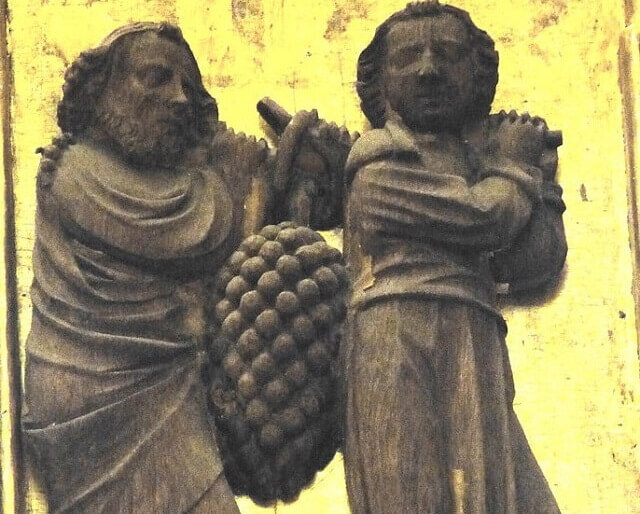
It is probably the most commonly asked question about the account of the Twelve Spies: how could the leaders of the Israelite tribes, who knew God had promised to bring the Jewish people to the Land of Israel, fail so spectacularly in their mission? Why did they return with an evil report of the Land and frighten the people?
Furthermore, do the sections that follow — the Temple wine libations and the mitzvah of Tzitzit — have any connection to the story of the Spies?
The Land’s Physical and Spiritual Powers
The psalmist writes that, since the Israelites rejected the Land of Israel, they were punished with exile and dispersion to other lands:
They rejected the desirable land, and put no faith in His promise. They grumbled in their tents and disobeyed God. So He raised His hand in oath to make them fall in the wilderness, to disperse their descendants among the nations and scatter them throughout the lands. (Psalms 106:24-27)
Why is the Land of Israel so special? Does it not say that “the whole earth is filled with His glory” (Isaiah 6:3)?
According to Rabbi Yochanan, the Flood in the time of Noah did not reach the Land of Israel (Zevachim 113a). The Land of Israel was not damaged by the waters of the Flood, but retained its pristine powers from the time of the world’s creation. Thus the spies encountered the ancient Nephilim, still roaming the Land.
Eretz Yisrael also retained its original spiritual qualities. It is thus the land of prophecy (Kuzari 2:14). The Talmud teaches that Ezekiel could only prophesy in Babylonia because he had already begun that prophecy in the Land of Israel (Moed Katan 25a).
God’s glory fills the entire universe, but He restricted His Shechinah to Jerusalem and the Holy of Holies. God similarly chose one people out of all the nations. There is a parallel between the special sanctity of the Land of Israel and that of the Jewish people. Just as the Jewish people are the ‘heart’ of all peoples,1 so, too, the Land of Israel is the ’soul’ of all lands.
Holiness of Earth and Air
The Sages ruled that all lands outside the Land of Israel are ritually impure. At first they ruled that the earth from other lands is impure. Then they ruled that even the air is impure (Shabbat 15).
The Land of Israel, by contrast, is blessed with two qualities of holiness: holiness of its earth, and holiness of its air. What does this mean?
The Land’s “holiness of earth” is revealed in the special mitzvot that can only be performed in the Land of Israel: tithes of agricultural produce, first-fruits, the Sabbatical year, and so on. This is a holiness that manifests itself with practical acts in the physical realm.
“Holiness of the air,” on the other hand, refers to the Land’s special capacity for Divine inspiration, prophecy, and the Shechinah’s presence in the Temple.
Moses sought to gain both aspects of holiness. He was the greatest of all prophets, but he still pleaded with God to be allowed to enter the Land and experience the holiness of its mitzvot. “Let me cross over and see the good land” (Deut. 3:25). The Spies, on the other hand, thought that “holiness of air” is sufficient for the nation; this holiness is more spiritual and can accompany the Jewish people in any location. They sinned by rejecting the importance of the Land’s practical mitzvot — its “earth-holiness.”
After the sin of the Spies, God accepted Moses’ prayers. “I have forgiven as you asked. However,” God added, “as I live, God’s glory will fill all the world” (Num. 14:20-21). Since you have rejected the concentration of holiness in the Land of Israel and the Jewish people, God’s glory will spread throughout the world. The Jewish people will be scattered to other lands; and due to their dispersion, “many peoples will attach themselves to God” (Zech. 2:15). As the Sages taught, the function of exile is to enable converts to join the Jewish people (Pesachim 87b).
However, as Zechariah’s prophecy continues, וּבָחַר עוֹד בִּירוּשָׁלִָם — “He will choose Jerusalem once more” (2:16).
The Jewish people and those who join them will witness God’s selection of Jerusalem. They will reconnect with the Land of Israel and its special holiness. The sin of the Spies will be forgiven, and the exile of Israel will come to an end.
Combining Both Forms of Holiness
We can identify these two aspects of holiness in the mitzvot mentioned in the sections that follow. The Temple offerings are called “My bread” (Num. 28:2). They are the staple, the tangible part of the offerings, corresponding to the “earth-holiness” of the Land.
But that is not enough. The Torah commands that wine libations (nesachim) must accompany the offerings, adding an additional level of holiness, one of joy and higher spirit. The libations correspond to the Land’s “air-holiness.” Our Temple offerings must include both aspects of holiness.
The mitzvah of Tzitzit also has two parts. There are white strings, corresponding to the “earth-holiness” of the Land. And there is a string of Tekhelet-blue, corresponding to the holiness of the air and the sky. We are commanded to combine both forms of holiness in our lives, the practical and the atmospheric: “They shall include a twist of sky-blue wool in the corner tassels” (Num. 15:38).
(Adapted from Shemu'ot HaRe’iyah II, pp. 199-202).
1 Kuzari 2:36. “The metaphor of the heart and body stresses the centrality of the Jewish people in the cosmic plan. However, it equally emphasizes an organic, holistic view of the world... the heart itself would be rendered meaningless without its constant interaction with the other organs, despite its functional importance” (Prof. Shalom Rosenberg, ‘In the Footsteps of the Kuzari')